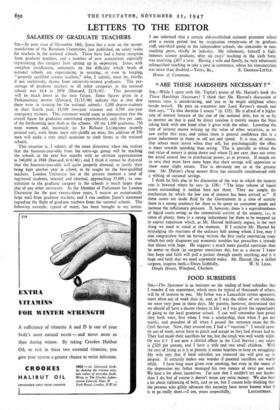4 g ARE THESE HARDSHIPS NECES S ARY ? "
SIRS While I agree with Mr. Taplin's praise of Mr. Harrod's book Are These Hardships Necessary? I think that Mr. Harrod's discussion of interest rates is unconvincing, and you or he might enlighten others beside myself. He puts an argument into Lord Keynes's mouth and then says,-" To that doctrine I assent " (p. 125). He is afraid of a higher rate of interest because of the size of the national debt, but in so far as interest on that is paid by direct taxation it merely means the State taking back with one hand what it gives with the other. Lowering the rate of interest means writing up the value of other securities, as we saw earlier this year, and unless there is general confidence this is a great inducement to many to sell out and spend. It is true, of course, that others must .invest when they sell, but psychologically the effect is more towards spending than saving. This is specially so where the real value of money is going down and where 21 per cent. does not cover the actual annual loss in purchasing power, as at present. If people are to save they must have some hope that their savings will appreciate or show some slight return. This is obviously not so at the .present time. Mr. Dalton's cheap money drive has naturally synchronised with a wilting of national savings.
I think he fails also in his discussion of the way in which the interest rate is lowered where he says (p. 128): " The large volume of liquid assets outstanding is neither here nor there. They are simply the mechanism by Which the low rate of interest has been arrived at." If these assets are made fluid by the Government in a time of scarcity there is a strong tendency for them to be spent on consumer goods and increase the inflationary pressure. If, however, there is a superabundance of liquid assets owing to the commercial activity of the country, i.e., in times of plenty, there is a strong inducement for them to be mopped up in capital expansion which, as Mr. Harrod brilliantly argues, is the very thing we need to avoid at the moment. If I criticise Mr. Harrod for misjudging the reactions of the ordinary folk among whom I live, may I also congratulate him on having written the first really convincing essay which not only diagnoses our economic troubles but prescribes a remedy that shines with hope. He suggests a much more painful operation than he seems to think (as surgeons sometimes do), but as a doctor I know that hope and faith will pull a patient through nearly anything, and it is hope and faith that we need supremely today. Mr. Harrod, like a skilled surgeon, inspires both.—Yours faithfully, W. N. LEAK. Dingle House, Winsford, Cheshire.


































 Previous page
Previous page